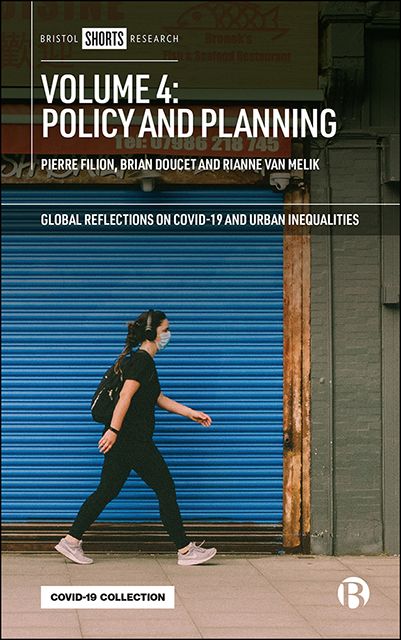Book contents
- Frontmatter
- Contents
- List of Figures and Tables
- Notes on Contributors
- Acknowledgments
- Preface to All Four Volumes of Global Reflections on COVID-19 and Urban Inequalities
- One Introduction: Policy Making in the Face of Uncertainty and Inequality
- Part I COVID-19 and Urban Changes
- Part II The Pandemic, Social Inequality, and Mobilization
- Part III Municipal and Urban Policy Responses
- Index
Ten - Combatting Older Adult Loneliness: It Takes a (Blended) Village
Published online by Cambridge University Press: 25 April 2023
- Frontmatter
- Contents
- List of Figures and Tables
- Notes on Contributors
- Acknowledgments
- Preface to All Four Volumes of Global Reflections on COVID-19 and Urban Inequalities
- One Introduction: Policy Making in the Face of Uncertainty and Inequality
- Part I COVID-19 and Urban Changes
- Part II The Pandemic, Social Inequality, and Mobilization
- Part III Municipal and Urban Policy Responses
- Index
Summary
Introduction
Older adults have been thrown into the spotlight of the COVID-19 pandemic and the bright lights have exposed both societies’ admirable and deplorable traits. We have seen stories of heart-warming compassion and deep-rooted ageism. From the appalling #boomerremover hashtag to the calls for mandatory quarantines for those over 70 years of age, public responses to COVID-19 demonstrate the role of age and (dis)ability in amplifying social and spatial inequalities. Although these reactions are unfounded, unethical, and have not received widespread political support, they do highlight the distressing interrelation of several truths: society at large is aging; older adults are at higher risk for developing more serious complications from COVID-19; and the social and physical infrastructure of cities has not been built to support the needs of older adults. In addition to the risks of COVID-19, the confluence of these three realities has potentially exacerbated a second public health crisis: loneliness. And as in the case of COVID-19, older adults are particularly susceptible. In this chapter we examine the relationship between COVID-19, social distance, social isolation, and loneliness with a focus on the older adult experience in urban and suburban environments. In addition to outlining the risks faced by older adults in times of crisis, we explore opportunities to strengthen social bonds while physically distancing through the development of blended communities or virtual retirement villages. Using the experience of the Oakridge Seniors Association in suburban Calgary, we offer targeted recommendations for community leaders and policy makers on how to minimize risk and maximize social cohesion by embracing communication technology while remembering the importance of human interaction. (Chapters Eleven and Twelve also explore the theme of selforganization in the face of the pandemic, but from the perspective of different national contexts and social categories.)
Loneliness, social isolation, and social distancing
We should differentiate between loneliness, social isolation, and social distancing. Loneliness is a subjective description of a person's emotional state, whereas social isolation is an objective measure of a person's lack of interaction with other people. Social distancing, as we have experienced during the COVID-19 pandemic, refers to limiting human interaction to curb the spread of a virus. By taking part in social distancing and significantly reducing physical interactions with others, many people are becoming increasingly socially isolated.
- Type
- Chapter
- Information
- Volume 4: Policy and Planning , pp. 101 - 110Publisher: Bristol University PressPrint publication year: 2021



